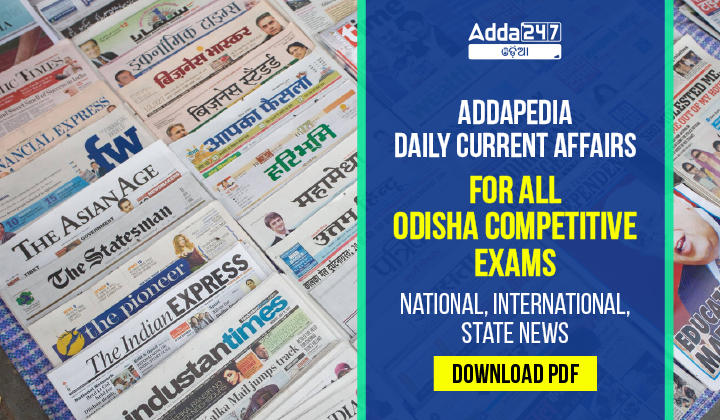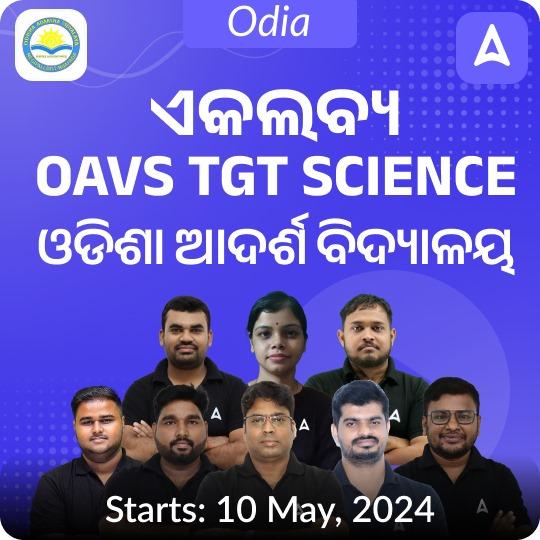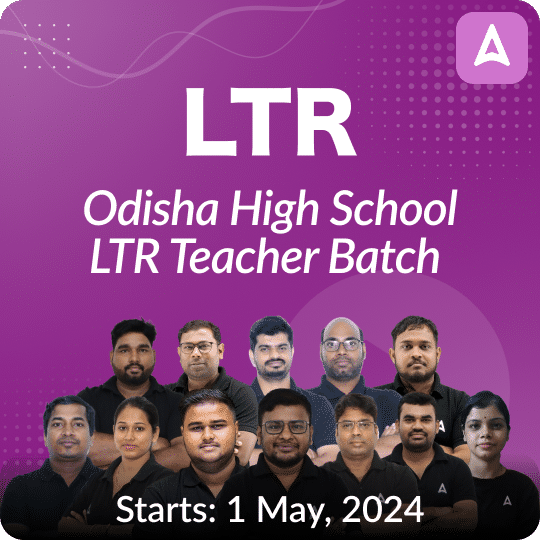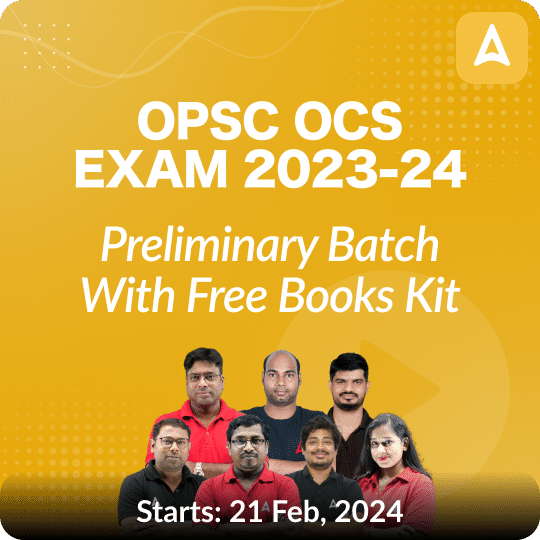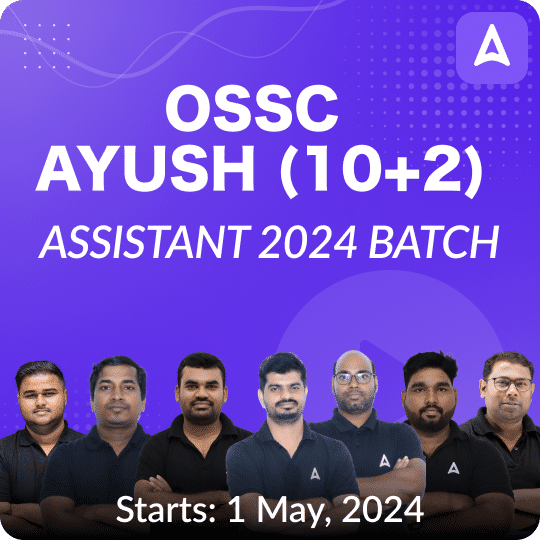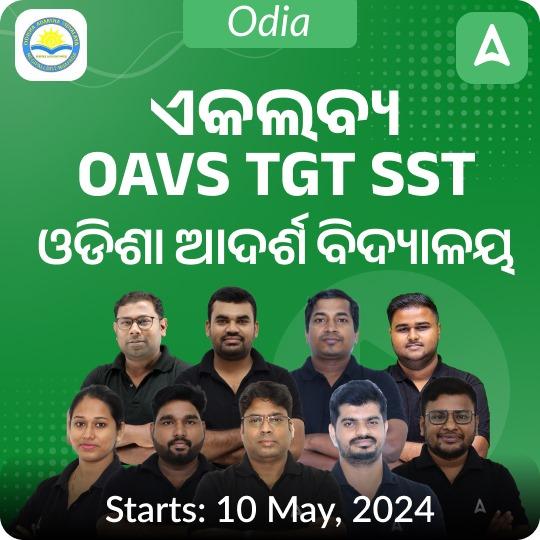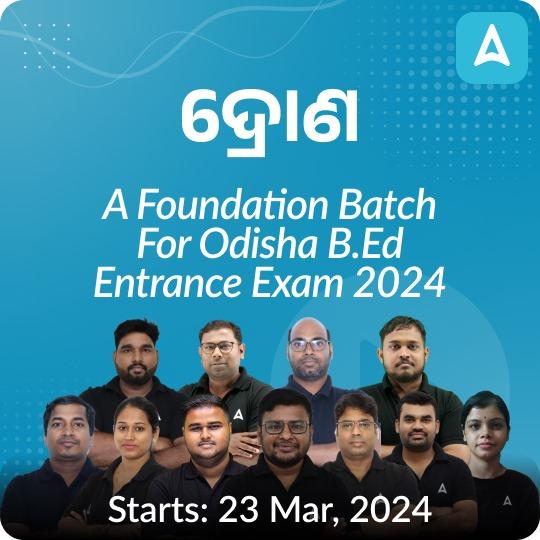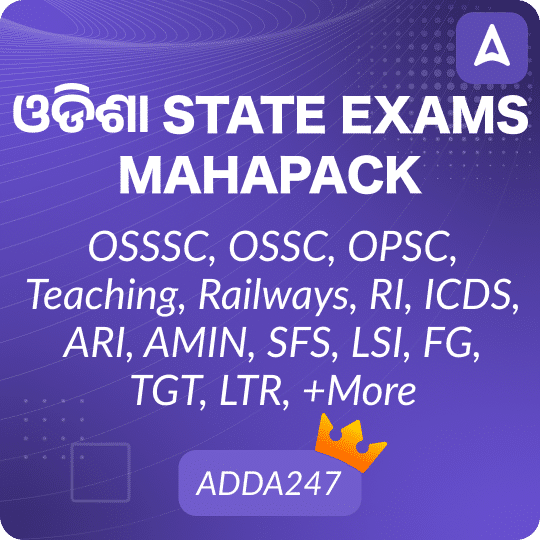As you are aware, in all competitive exams, the “Daily Current Affairs Section” holds significant importance in determining the cutoff scores. Therefore, if you excel in this section, you will have a better chance of achieving higher marks in these exams and securing a spot on the merit list.
Addapedia Odisha – Daily Current Affairs – 18 April 2024
| Green Credit Programme (GCP) |
Why in news?
- The Green Credit Programme (GCP) encourages organisations and individuals to invest in afforestation projects in ‘degraded’ forest lands for ‘green credits’.
- The Union Environment Ministry, the coordinator of the programme, emphasizes restoring ecosystems over merely tree planting.
Key points:
- Individuals and companies can apply to the Indian Council of Forestry Research and Education (ICFRE) to pay to “restore” ‘degraded’ forest lands.
- Two years after planting and following an evaluation by the ICFRE, each planted tree could be worth one ‘green credit.’
- These credits can be used to
- Comply with existing forest laws or for reporting under environmental, social and governance leadership norms or to meet corporate social responsibility requirements.
- As of now, these credits are not tradeable. However, the GCP aims to incentivise environmental positive actions through a market-based mechanism and generate green credit, which shall be tradable and made available for trading on a domestic market platform.
- The Environment Ministry has issued guidelines that States must rely on to calculate what it would cost to restore a degraded forest landscape.
- The Ministry has changed the earlier requirement of a minimum of 1,100 trees per hectare to qualify as reforested landscape and left it to States to specify them.
- Preference would be given to indigenous species and naturally growing seedlings would be retained.
- Public sector companies such as Indian Oil, Power Grid Corporation, National Thermal Power Corporation, Oil India, Coal India, and National Hydropower Corporation had registered to invest in the programme.
Think:
- Know about Indian Council of Forestry Research and Education (ICFRE).
- Know about Carbon Credit Trading Scheme (CCTS).
|
| Malcom Adiseshiah
Award 2024 and Elizabeth Adiseshiah Citation-2024
Malcolm Sathiyanathan Adiseshiah |
Why in news?
- Surinder S. Jodhka, professor, School of Social Sciences, Jawaharlal Nehru University, has been chosen for the Malcom Adiseshiah Award 2024.
- Vikas Kumar, associate professor, School of Development, Azim Premji University, will receive the Elizabeth Adiseshiah Citation-2024.
- Every year, the awards are given to outstanding social scientists.
Key Points:
- It is awarded by the Malcolm and Elizabeth Adiseshiah Trust.
- Malcom Adiseshiah award carries a citation and a cash prize of Rs.2 lakhs.
- Elizabeth Adiseshiah Award will carry a cash prize of Rs.1 lakh.
- The award is open to Indian and foreign scholars ordinarily resident in India.
Did you know:
- Malcolm Sathiyanathan Adiseshiah (18 April 1910 – 21 November 1994) was an Indian development economist and educator.
About Malcolm Sathiyanathan Adiseshiah:
- He was born in Vellore, Tamil Nadu.
- He obtained a doctorate in economics at the London School of Economics.
- In 1976, he was awarded the Padma Bhushan, India’s third-highest civilian award.
- In 1998, UNESCO created the Malcolm Adiseshiah International Literacy Prize in recognition of his contribution to education and literacy.
- He was nominated to the Rajya Sabha, the upper house of the Parliament of India, in 1978.
- He served as the Vice Chancellor of the University of Madras from 1975 to 1978.
- He was the founder of the Madras Institute of Development Studies (MIDS).
- He was associated with a number of professional bodies both in India and abroad.
|
| The Great Indian Bustard |
Why in news?
- The Supreme Court of India has recently recognised a fundamental right to be free from the adverse impacts of climate change.
- This judgment has attracted significant attention, particularly from environmentalists, with a focus on its implications for the protection of the Great Indian Bustard.
About The Great Indian Bustard:
- The Great Indian Bustard is considered a flagship species of grassland ecology, indicating the health of the ecosystem.
- The majority of its population is found in Rajasthan and Gujarat, with smaller populations in Maharashtra, Karnataka, and Andhra Pradesh.
- The species is listed as Critically Endangered according to the International Union for Conservation of Nature (IUCN).
- It is protected under Schedule I of the Wildlife Protection Act, 1972.
- The species is listed in Appendix I of both the Convention on International Trade in Endangered Species of Wild Fauna and Flora (CITES) and the Convention on Migratory Species (CMS), indicating it is among the most endangered species in the world.
|
| Heat Action Plans (HAPs) |
Why in news?
- The India Meteorological Department (IMD) has predicted an increase in the maximum temperature and the frequency of heatwave conditions in the upcoming days, particularly over eastern and southern India.
- In response, governments at various levels — including State, district, and city — have prepared Heat Action Plans (HAPs).
About Heat Action Plans (HAPs):
- The National Disaster Management Authority (NDMA) and India Meteorological Department (IMD) are collaborating with 23 states to develop HAPs.
- HAPs serve as a comprehensive early warning system and preparedness plan for extreme heat events.
- The plan includes both immediate and long-term actions to:
- Increase preparedness
- Enhance information-sharing
- Improve response coordination
- The primary goal of HAPs is to reduce the health impacts of extreme heat on vulnerable populations.
- On a regional level, the Ahmedabad Municipal Corporation (AMC) prepared the first Heat Action Plan in 2013, in response to the devastating heatwave-related deaths in 2010.
What is Heatwave?
- A heat wave, sometimes described as extreme heat, is a period of abnormally hot weather.
- It is usually measured relative to the usual climate in the area and to normal temperatures for the season.
- High humidity often accompanies heat waves, especially in oceanic climate countries.
- In India, the India Meteorological Department (IMD) has specific criteria for declaring a heat wave.
- It is considered if the maximum temperature of a station reaches at least 40°C or more for Plains, and at least 30°C or more for Hilly regions. If the above criteria are met at least in 2 stations in a Meteorological sub-division for at least two consecutive days, it is declared a heatwave on the second day.
|
| Nagorno-Karabakh region |
Why in news?
- Russian peacekeepers have started withdrawing from Nagorno-Karabakh, a territory disputed between Azerbaijan and Armenia.
- The conflict has affected ties between Russia and Armenia, with Armenia suspending its participation in the Moscow-led Collective Security Treaty Organisation (CSTO).
About Nagorno-Karabakh region:
- Geography: Nagorno-Karabakh is a landlocked, mountainous, and forested region located in the South Caucasus region. It is internationally recognized as part of Azerbaijan.
- Control: Most of the region is controlled by Armenian separatists, despite being part of Azerbaijan territory since the Soviet era.
- Current Status: The area, while remaining in Azerbaijan, is governed by separatist Armenians who have declared it a republic called the “Nagorno-Karabakh Autonomous Oblast”. The Armenian government supports the region politically and militarily but does not recognize it as independent.
- Peace Efforts: The Organization for Security and Co-operation in Europe (OSCE) Minsk Group, chaired by France, Russia, and the US, has tried to get the two countries to reach a peace agreement for several years.
|
MCQs
- Who can apply to the Indian Council of Forestry Research and Education (ICFRE) to pay to “restore” ‘degraded’ forest lands?
- Only individuals
- Only companies
- Both individuals and companies
- None of the above
Answer: Both individuals and companies
Explanation:
- The Green Credit Programme (GCP) encourages organisations and individuals to invest in afforestation projects in ‘degraded’ forest lands for ‘green credits’.
- The Union Environment Ministry, the coordinator of the programme, emphasizes restoring ecosystems over merely tree planting.
- Individuals and companies can apply to the Indian Council of Forestry Research and Education (ICFRE) to pay to “restore” ‘degraded’ forest lands. Hence option c is correct.
- Two years after planting and following an evaluation by the ICFRE, each planted tree could be worth one ‘green credit.’
- These credits can be used to
- Comply with existing forest laws or for reporting under environmental, social and governance leadership norms or to meet corporate social responsibility requirements.
- Which organization created the Malcolm Adiseshiah International Literacy Prize in 1998 in recognition of Malcolm Sathiyanathan Adiseshiah’s contribution to education and literacy?
- Madras Institute of Development Studies (MIDS)
- The United Nations Children’s Fund (UNICEF)
- Ministry of Education, India
- The United Nations Educational, Scientific and Cultural Organization
Answer: The United Nations Educational, Scientific and Cultural Organization
Explanation:
- Malcolm Sathiyanathan Adiseshiah (18 April 1910 – 21 November 1994) was an Indian development economist and educator.
- He was born in Vellore, Tamil Nadu.
- He obtained a doctorate in economics at the London School of Economics.
- In 1976, he was awarded the Padma Bhushan, India’s third-highest civilian award.
- In 1998, UNESCO created the Malcolm Adiseshiah International Literacy Prize in recognition of his contribution to education and literacy.
- He was nominated to the Rajya Sabha, the upper house of the Parliament of India, in 1978.
- He served as the Vice Chancellor of the University of Madras from 1975 to 1978.
- He was the founder of the Madras Institute of Development Studies (MIDS).
- He was associated with a number of professional bodies both in India and abroad.
MCQs
- Under which schedule of the Wildlife Protection Act, 1972 is the Great Indian Bustard protected?
- Schedule I
- Schedule II
- Schedule III
- Schedule IV
Answer: Schedule I
Explanation:
- The Great Indian Bustard is considered a flagship species of grassland ecology, indicating the health of the ecosystem.
- The majority of its population is found in Rajasthan and Gujarat, with smaller populations in Maharashtra, Karnataka, and Andhra Pradesh.
- The species is listed as Critically Endangered according to the International Union for Conservation of Nature (IUCN).
- It is protected under Schedule I of the Wildlife Protection Act, 1972. Hence option a is correct.
- The species is listed in Appendix I of both the Convention on International Trade in Endangered Species of Wild Fauna and Flora (CITES) and the Convention on Migratory Species (CMS), indicating it is among the most endangered species in the world.
- Which two organizations are collaborating with 23 states to develop Heat Action Plans (HAPs)?
- Indian Space Research Organisation (ISRO) and India Meteorological Department
- National Disaster Management Authority (NDMA) and India Meteorological Department
- Ministry of Environment, Forest and Climate Change (MoEFCC) and National Institute of Disaster Management (NIDM)
- National Disaster Management Authority (NDMA) and Ministry of Environment, Forest and Climate Change (MoEFCC)
Answer: National Disaster Management Authority (NDMA) and India Meteorological Department
Explanation:
- The National Disaster Management Authority (NDMA) and India Meteorological Department (IMD) are collaborating with 23 states to develop Heat Action Plans (HAPs).
- HAPs serve as a comprehensive early warning system and preparedness plan for extreme heat events.
- The plan includes both immediate and long-term actions to:
- Increase preparedness
- Enhance information-sharing
- Improve response coordination
- The primary goal of HAPs is to reduce the health impacts of extreme heat on vulnerable populations.
- On a regional level, the Ahmedabad Municipal Corporation (AMC) prepared the first Heat Action Plan in 2013, in response to the devastating heatwave-related deaths in 2010.
- Nagorno-Karabakh is a disputed region between which of the following countries?
- Israel and Syria
- Denmark and Sweden
- Russia and Ukraine
- Azerbaijan and Armenia
Answer: Azerbaijan and Armenia
Explanation:
- Russian peacekeepers have started withdrawing from Nagorno-Karabakh, a territory disputed between Azerbaijan and Armenia.
- The conflict has affected ties between Russia and Armenia, with Armenia suspending its participation in the Moscow-led Collective Security Treaty Organisation (CSTO).
- Geography: Nagorno-Karabakh is a landlocked, mountainous, and forested region located in the South Caucasus region. It is internationally recognized as part of Azerbaijan.
- Control: Most of the region is controlled by Armenian separatists, despite being part of Azerbaijan territory since the Soviet era.
- Current Status: The area, while remaining in Azerbaijan, is governed by separatist Armenians who have declared it a republic called the “Nagorno-Karabakh Autonomous Oblast”. The Armenian government supports the region politically and militarily but does not recognize it as independent.
- Peace Efforts: The Organization for Security and Co-operation in Europe (OSCE) Minsk Group, chaired by France, Russia, and the US, has tried to get the two countries to reach a peace agreement for several years.
| Odisha Regional Specific News |
| DRDO Successfully Tests Indigenous Technology Cruise Missile off Odisha Coast |
Context:
- The Defence Research and Development Organisation (DRDO) achieved a milestone with the successful flight test of the Indigenous Technology Cruise Missile (ITCM) from the Integrated Test Range (ITR), Chandipur, along the Odisha coast on April 18, 2024.
- Successful development of an indigenous long-range subsonic cruise missile powered by indigenous propulsion is a significant milestone for Indian defence R&D.
Key points:
-
- The missile’s performance was closely monitored by various Range Sensors such as Radar, Electro Optical Tracking System (EOTS), and Telemetry deployed by ITR at different locations to ensure full coverage of the flight path.
- The flight of the missile was also monitored from the Su-30-Mk-I aircraft of the Indian Air Force.
- This successful flight test also validated the reliable performance of the indigenous propulsion system developed by the Gas Turbine Research Establishment (GTRE), Bengaluru.
About:
- Equipped with advanced avionics and software for better and reliable performance, the missile was developed by the Bengaluru-based DRDO laboratory Aeronautical Development Establishment (ADE), with contributions from other laboratories and Indian industries.
- The test was witnessed by many senior scientists from various DRDO laboratories, along with representatives from the production partner.
|
| Akhand Shikar |
Context:
- The traditional ritual of ‘Akhand Shikar’, observed annually by tribals, has resulted in significant destruction of forest cover and loss of wildlife lives in this district, as highlighted by officials and environmentalists.
- This practice has intensified human-animal conflicts, leading to casualties and injuries on both sides.
About:
- It is an annual hunting ceremony known as akhand shikar or mass hunting excursion”
- The ritual normally begins in mid-April on Chaitra Sankranti.
- During the ritual, the tribals set up shikar camps and hunt down animals mercilessly.
- This ritual, deeply rooted in tradition, has been practiced for generations, originally carried out openly but now conducted secretly due to anti-poaching laws. Efforts by law enforcement agencies to curb this practice have had limited success, indicating a need for more effective measures.
- Additionally, the indiscriminate felling of Sal trees during ‘Pana Sankranti’ has raised concerns among environmentalists like Bhakta Batshal Mohanty, who advocate for stricter conservation efforts to protect the diverse wildlife inhabiting the forests and hills surrounding Keonjhar town.
|
| HC Stays OSPCB Closure Order For Jindal’s Thermal Plant In Odisha’s Angul |
Context:
-
- The Orissa High Court has stayed the closure order issued by the Odisha State Pollution Control Board (OSPCB) for Jindal India Thermal Power (JITP)’s plant in Angul.
- The court emphasized the need to balance environmental concerns with the operational needs of industries.
Background:
- The pollution control body had issued the closure notice due to JITP’s discharge of waste water into Kaudia nullah, which flows into the Tikira river.
Key points:
- Justice Panigrahi cautioned against overly rigid adherence to rules, emphasizing the importance of considering the purpose and substance of regulations.
- He highlighted that thermal power plants like JITP’s are crucial for the state’s energy infrastructure, especially during peak demand periods in summer. Abrupt closure could lead to significant social and economic consequences, including job losses and disruptions to power supply.
- The judge mentioned that JITP and an independent agency had assured that the discharged waste water was not hazardous.
- He stressed the need to balance environmental concerns with the practical challenges faced by businesses.
- The stay order will be effective until July 25, when further hearing on JITP’s petition will take place with a response from OSPCB.
|
| Heat Wave |
Context:
- India Meteorological Department (IMD) has issued severe heat wave warnings for several districts in Odisha.
- Specifically, severe heat waves are expected to affect isolated pockets in Mayurbhanj, Nuapada, Angul, and Nayagarh.
What is Heatwave?
- A heat wave, sometimes described as extreme heat, is a period of abnormally hot weather.
- It is usually measured relative to the usual climate in the area and to normal temperatures for the season.
- High humidity often accompanies heat waves, especially in oceanic climate countries.
- In India, the India Meteorological Department (IMD) has specific criteria for declaring a heat Wave.
- It is considered if the maximum temperature of a station reaches at least 40°C or more for Plains, and at least 30°C or more for Hilly regions.
- If the above criteria are met at least in 2 stations in a Meteorological sub-division for at least two consecutive days, it is declared a heatwave on the second day.
|
| World Heritage Day |
Context:
- World Heritage Day, also known as the International Day for Monuments and Sites, is celebrated on April 18th every year.
- It aims to raise awareness about the cultural and natural heritage sites around the world.
- The day promotes the preservation of these irreplaceable treasures and encourages people to appreciate the diversity of our planet’s heritage.
- It also highlights the vulnerability of these sites and the need for ongoing conservation efforts.
About:
- The day was first celebrated by the United Nations Educational, Scientific and Cultural Organization (UNESCO) in 1983.
Theme:
- The theme for World Heritage Day 2024 is “Disasters & Conflicts Through the Lens of the Venice Charter.”
- This theme marks the 60th anniversary of the Venice Charter, a document outlining principles for conservation.
- It emphasizes how we can use these principles to address the challenges of safeguarding cultural heritage sites in the face of disasters and conflicts.
|
| Copyright © by Adda247
All rights are reserved. No part of this document may be reproduced, stored in a retrieval system or transmitted in any form or by any means, electronic, mechanical, photocopying, recording or otherwise, without prior permission of Adda247. |

